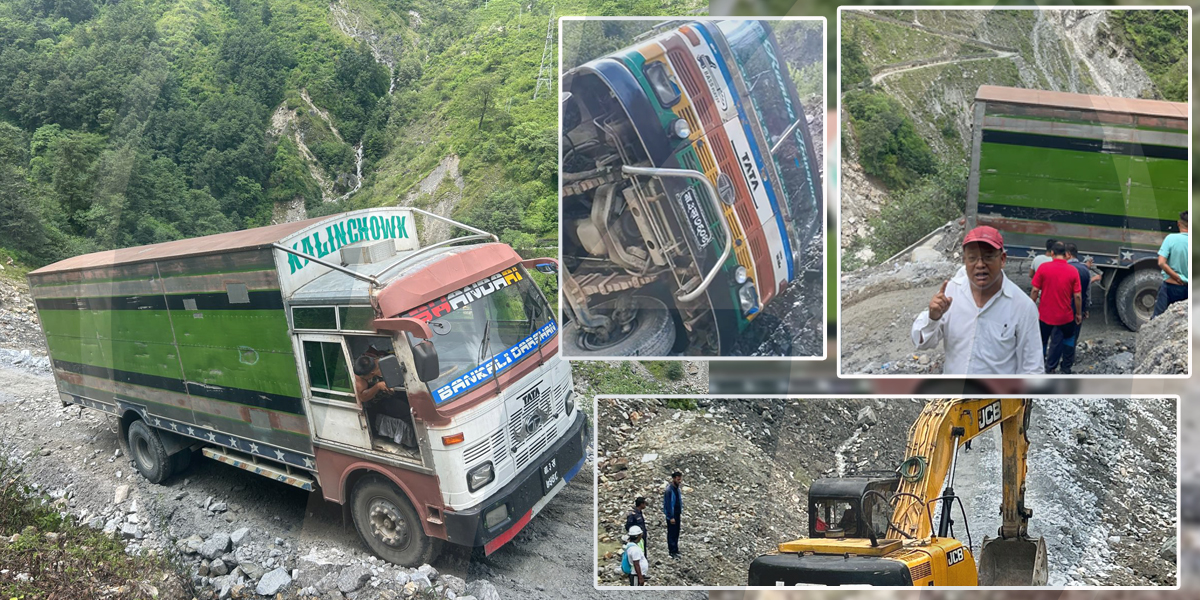KATHMANDU: The Araniko Highway, a 114-kilometer road connecting Nepal to China, was completed 57 years ago in 1967.
Also known as the Kodari Highway, it extends from Kathmandu to Kodari, near the Chinese border.
The Araniko Highway holds historical significance as the first road across the Himalayas to establish road traffic between China and South Asia.
When King Mahendra began the project with Chinese assistance, Nepal faced an Indian blockade in 1969, which lasted until the aftermath of the Sino-Indian War.
Following India’s defeat in the war, Indian Prime Minister Jawaharlal Nehru lifted the blockade, allowing the construction of the road.
Despite its important role in expanding Nepal’s road network and fostering relations with neighboring countries, the Araniko Highway has been neglected for years due to a lack of maintenance and upgrades.
The road, which connects Kathmandu to the northern Tatopani checkpoint via Dhulikhel, was severely damaged in the 2015 earthquake and has suffered further damage due to floods and landslides this year.
The Tatopani Customs Office reports that goods worth billions of rupees have been imported through the checkpoint, but the poor condition of the roads has hindered the efficient movement of goods and the facilitation of imports.
Although Chinese assistance facilitated the opening of an intermediate lane in the past, the full expansion and reconstruction of the road remain incomplete.
As a result, bilateral transit between Nepal and China has been disrupted, and the government has failed to collect the expected revenue due to the poor condition of the road, which is a vital trade route.
Goods worth billions of rupees are imported annually through the Tatopani checkpoint, but the lack of a reliable road infrastructure has hindered economic growth.
For eight consecutive years until the fiscal year 2077/78 BS, the Tatopani Customs Office could not meet its revenue targets because of the deteriorating road conditions.
Although the customs office managed to collect 233.51% of its target in the 2078/79 BS fiscal year after partial repairs, recent floods and landslides have once again disrupted traffic.
Much of the Highway, except for a few sections with two lanes, remains narrow, often only slightly wider than a single lane.
As a result, containers transporting goods from China frequently get stuck, and heavy rains can cause the road to be completely blocked.
For instance, from the last week of September, continuous rain caused widespread landslides, blocking the highway for two weeks.
The blocked road stranded hundreds of containers carrying goods for the Dashain festival, which were only cleared after the landslides were removed.
The floods also destroyed concrete bridges over the Larcha and Liping rivers and inundated a section of the road in Kodari and Koplang.
The temporary diversion along the Siddhartha Highway, made by placing gravel over a makeshift pipe, is reminiscent of a rural seasonal road, making the transportation of containers from the Tatopani checkpoint even more challenging.
The Siddhartha Highway, which stretches from Dhulikhel in Kavre to the Tatopani checkpoint (Miteri Bridge), is critical for trade but in poor condition.
Despite the importance of this Highway, the expansion of the five-kilometer stretch from Dhulikhel to Khawan has stalled for years.
Similarly, the 48-kilometer section from Khawan to Barhabise has been poorly maintained, with many areas unpaved and prone to landslides.
The most deteriorated section is the 27-kilometer stretch from Barhabise to Miteri Bridge, which has not seen any upgrades or reconstruction for years. The government has failed to award a contract for road expansion or improvements.
Amit Kumar Shrestha, Chief of the Road Division Office in Charikot, explained that landslides have made the road between Bandevi to Barhabise and Barhabise to Miteri Bridge one-way in places.
The 19-kilometer stretch from Bandevi to Barhabise and the 26-kilometer stretch from Barhabise to Miteri are in particularly bad condition, with no significant upgrades for many years.
According to Shrestha, the 26-kilometer Barhabise-Miteri section requires a complete upgrade, while the 19-kilometer Bandevi-Barhabise section remains in disrepair.
Budget of Rs 4.5 billion sought for upgrading Araniko Highway
The Ministry of Physical Infrastructure and Transport has requested a budget of Rs 4.46 billion for the upgrading and reconstruction of the 75-kilometer stretch from Bandevi to Miteri Bridge, leading to the Tatopani checkpoint.
The ministry has submitted a proposal to the National Planning Commission, seeking funds for the project under a multi-year contract.
The Ministry of Finance allocates budgets based on the commission’s recommendations.
During the previous Prime Minister Pushpa Kamal Dahal’s visit to China, there was an agreement in principle for China to undertake the reconstruction of the Araniko and Kodari highways, including the stretch leading to the Tatopani checkpoint.
However, ministry officials have stated that the requested budget has not been approved yet.
The proposed budget aims to completely upgrade the road from Bahrabise to Miteri Bridge and rehabilitate the 19-kilometer stretch from Bandevi to Bahrabise.
Revenue loss due to poor road access
The Tatopani checkpoint, which had been closed before the COVID-19 pandemic, reopened in September 2020.
This checkpoint is a key entry point for goods imported from China. However, the lack of proper road infrastructure to and from the checkpoint has significantly impacted government revenue collection.
Over the past few years, statistics show a substantial loss in revenue due to inadequate road access.
The Tatopani Customs Office reports that goods worth billions of rupees have been imported through the checkpoint, but the poor condition of the roads has hindered the efficient movement of goods and the facilitation of imports.
In the fiscal year 2076/077 BS, goods worth Rs 9.53 billion were imported from China through the checkpoint.
However, the government was only able to collect Rs 1.58 billion in revenue, falling far short of the target of Rs 4.72 billion — collecting just 33% of the target.
In the following fiscal year, 2077/078 BS, revenue collection further declined. The government collected only Rs 1.26 billion, or 18% of the target of Rs 5.47 billion.
There was some improvement in fiscal year 2078/079 BS. Revenue collection exceeded expectations, with Rs 3.425 billion collected against a target of Rs 1.467 billion, as the pandemic restrictions were lifted, and imports through the checkpoint gradually resumed.
In the fiscal year 2079/080 BS, revenue collection reached Rs 3.279 billion, still short of the target of Rs 4.629 billion.
However, in fiscal year 2080/081 BS, imports from China surged, with goods worth Rs 40.43 billion entering Nepal through the checkpoint.
According to the Ministry of Physical Infrastructure and Transport, the upgrade of the Barhabise-Tatopani road is a key item on the agenda for Prime Minister Oli’s visit, with the Chinese government having already expressed its readiness to assist in the project.
In that year, the government collected Rs 13.315 billion in revenue, surpassing the target by 58%.
The role of Chinese assistance in road expansion
Despite these improvements, the lack of road expansion and upgrading remains a key obstacle.
One of the main reasons for the delay in signing a contract for the road’s expansion is the expectation that China will fund and carry out the project.
China has shown willingness to upgrade the road to facilitate the transportation of goods from the Tatopani checkpoint.
During the previous Prime Minister Pushpa Kamal Dahal’s visit to China, there was an agreement in principle for China to undertake the reconstruction of the Araniko and Kodari highways, including the stretch leading to the Tatopani checkpoint.
However, progress on this agreement has been stalled in Kathmandu. Delays are being attributed to internal political factors, including differing views within Nepal’s ruling party, the Nepali Congress, towards China, and the influence of the Maoist Center on foreign policy decisions.
Agreement expected during PM Oli’s China visit
On October 2, 2024, Chinese Ambassador Chen Song announced that China is prepared to upgrade the Barhabise-Tatopani road section.
He emphasized that China would assist in improving the road and the checkpoint leading to Miteri Bridge to make them more organized and efficient.
Prime Minister KP Sharma Oli, who is scheduled to visit China today (December 2, 2024), is expected to discuss and potentially finalize an agreement with the Chinese government regarding the road upgrade during his trip.
According to the Ministry of Physical Infrastructure and Transport, the upgrade of the Barhabise-Tatopani road is a key item on the agenda for Prime Minister Oli’s visit, with the Chinese government having already expressed its readiness to assist in the project.









Comment